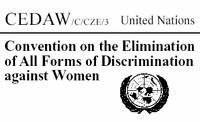| |
Czech Republic CEDAW Shadow
Report |
| |
| |
 |
| Source:
http://daccessdds.un.org/ | The European
Roma Rights Centre (ERRC), Gender Studies, and the League of Human
Rights (hereafter the “partners”) jointly submit this shadow report
to the United Nations Committee on the Elimination of Discrimination
Against Women (hereafter the "Committee") commenting on the Third
Periodic Report of the Czech Republic submitted under Article 18 of
the United Nations Convention on the Elimination of All Forms of
Discrimination against Women (hereafter the "Convention").
The present shadow report addresses a number of categories
of serious human rights abuses of women, including extreme forms of
abuse such as domestic violence and coercive sterilisation, as well
as very problematic law, policy, and practice in a number of areas
of relevance to the Convention. This submission is not
comprehensive. Its sole purpose is to present several areas of
problematic law, practice and policy arising in Convention areas.
The present submission is structured according to relevant
Convention articles.
Czech authorities have recently
recognized – but by no means yet addressed adequately – the problem
of coercive sterilisation of Romani women. In December 2005 the
Public Defender of Rights (hereafter the Ombudsman) issued a report
concluding that, according to the Ombudsman's investigation,
sterilisation without free and informed consent was practiced during
the communist era as well as after 1989. The most recent documented
case is from 2001. The overwhelming majority of the victims are
Romani women. The Ombudsman recommended several legislative,
methodological, and reparations measures. Despite the Ombudsman’s
recommendations, few victims have yet received compensation, and
without government action, most will be precluded from access to
justice. No persons have yet been prosecuted by Czech authorities in
connection with these extreme harms. Responses by the Czech
Government to the questions of the CEDAW Committee on these matters
are inadequate in the extreme.
Regarding the problem of
domestic violence, significant progress has been achieved especially
in regard to the legal protection of victims. However, the
effectiveness of legislation is compromised by insufficient training
of police, medical professionals, and staff of child protection
agencies; lack of an interdisciplinary approach to the problem at
local level; the absence of therapeutic programs for perpetrators as
well as for victims; a complete lack of services to victims in some
regions and an overall lack of comprehensive services nationwide;
absence of an independent mechanism for investigating allegations of
crimes committed by police officers or ex-police officers; the
difficult financial situation of most victims; and lack of
protection against “stalking”.
Legal protection against
discrimination remains insufficient because, despite efforts and
pressure by a number of agencies including the European Union, the
Czech Parliament has to date failed to adopt a comprehensive
anti-discrimination law. Women suffer direct and indirect forms of
discrimination on the labour market, and Romani women experience
particularly extreme levels of discrimination, often compounded by
intense levels of anti-Romani antipathy in the Czech Republic. Few
if any cases of gender discrimination have been addressed by any
Czech authority and only a handful of cases of discrimination
against Romani women have been positively resolved. Legal
possibilities to introduce positive obligations to hire women – and
in particular minority women – have not yet been used. There is deep
public opposition to positive action measures for Romani women, and
there are no known examples of positive action hiring of Romani
women in mainstream employment in the Czech Republic.
Government policy to address discrimination against women,
and in particular against women from marginalised groups, has been
to date ineffective where existing, and is in many areas completely
non-existent. The ineffectiveness of governmental policies is
influenced by government failure to prioritise gender equality to
the level merited. In addition, there is a general lack of awareness
among the public and a general disregard for gender equality among
the political representatives. Support for gender equality by the
government is neither long-term nor structured. All activities in
this area are almost entirely realised by NGOs, activities that
should be either developed by or at least supported by the state. At
the regional level there are no activities defined so as to
structurally consider gender equality issues. The government’s
actions against gender stereotypes are insufficient and
insignificant. Multiple or compound discrimination against Romani
women is not the subject of any effective government policy, and
action in this area is extremely weak.
The participation of
women in politics remains low. A law aiming to improve the
representation of women in a number of representative bodies
(including Czech Parliament and the European Parliament) has not yet
entered into force, and in any case covers only a limited number of
bodies. The Czech Republic has one of the lowest rates of
participation of women in public life in the European Union.
The government has not adopted any actions to increase the
low participation of women amongst those studying the sciences and
technology. Education reform has been cosmetic and formal, with
little impact of desegregating Czech education so that Romani
children might have equal access to education.
Child support
is very difficult to access in cases in which an authority has
ordered child support payments be made by a parent not present in
the household and the parent does not fulfill his/her obligations to
pay alimony. This has a serious adverse impact on the financial
situation of single mothers. A bill proposing the state cover child
support for parents not fulfilling their obligations and then
recover the amounts due from the parent in question (instead of
leaving all actions in such matters up to the single parent caring
for children) has been rejected.
Finally, the Czech Republic
remains the country with the highest rate of children under 3 being
placed into state care in the EU. |
 |
News author:
Ostalinda Maya Ovalle 
| | |